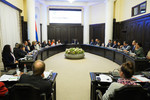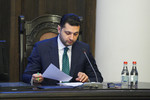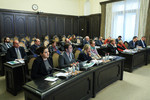Friday, 9 December 2022
The second meeting of the policy dialogue series of the "GREEN Armenia" platform takes place at Government
Chaired by Deputy Prime Minister Hambardzum Matevosyan, the second meeting of the policy dialogue series of the "GREEN Armenia" platform was held today. The Resident Representative of the United Nations Development Program in Armenia, Natia Natsvlishvili, the head of the European Union delegation in Armenia, Ambassador Andrea Wiktorin, Country Manager of the World Bank for Armenia Carolin Geginat, representatives of a number of concerned government institutions, as well as private sector, scientific institutions, civil society and development organizations participated in the discussion.
During the meeting, reference was made to the framework of the green economy policy, strategic planning and implementation proposed to Armenia.
Welcoming the participants of the meeting, the Deputy Prime Minister emphasized the importance of the involvement of all the stakeholders - representatives of international and non-governmental organizations, academia and the private sector - in forming a joint agenda for the transition to a green economy. "Today's meeting aims to transition to more substantive discussions aimed at the need to increase the resilience of the economy in the face of global and local climate challenges. Our commitments in this direction are clearly defined in the Government's 2021-2026 Action Plan, in which the transformation of the economy in accordance with the low-carbon energy reality and the provision of the prerequisites for the long-term preservation of natural resources in the economic cycle are defined as important preconditions for sustainable development", the Deputy Prime Minister noted.
UNDP Resident Representative in Armenia Natia Natsvlishvili highly appreciated the platform's role in the process of developing better and "green" policies for Armenia and its population. "Today, we are one step closer to realizing that promise by analyzing the essential elements of green economy policies and trying to turn high-level policy statements, such as the green transition vision and the country's strategic goals, into operational-level policies," Natsvlishvili emphasized, adding that Armenia is not alone in this process.
The participants of the meeting also discussed the possible main directions Armenia’s green and sustainable economic development strategy and its road map, which is currently being developed by the Ministry of Economy of Armenia in cooperation with other state bodies and international and local stakeholders.
According to the head of the EU delegation in Armenia, Ambassador Andrea Wiktorin, the international experience, especially the European model, has proven that the protection of the environment does not contradict the economic well-being, on the contrary, these two directions can complement each other. "The transition to green economic management can create many opportunities for businesses and job seekers, as well as increase the resilience and competitiveness of Armenian products and services in international markets," said the head of the EU delegation, reaffirming the EU's readiness to actively participate in the dialogue on sectoral policies in Armenia and coordination of donors.
During the meeting, separate thematic discussions on sustainable finance, green taxonomy, circular economy and current initiatives in Armenia took place.
Noting that Armenia is a country vulnerable to climate change, Country Manager of the World Bank for Armenia Carolin Geginat emphasized the need to transition to a greener economy model, which, taking into account this vulnerability, will also create significant growth opportunities. "The vision of Armenia's green economy, which was discussed today, is the first important step towards realizing the potential of green growth," Geginat emphasized.
During the discussions, the participants of the meeting emphasized the need to create a favorable environment for the protection of natural ecosystems, the development of human capital and the promotion of greater investments in the transition to a green economy.









